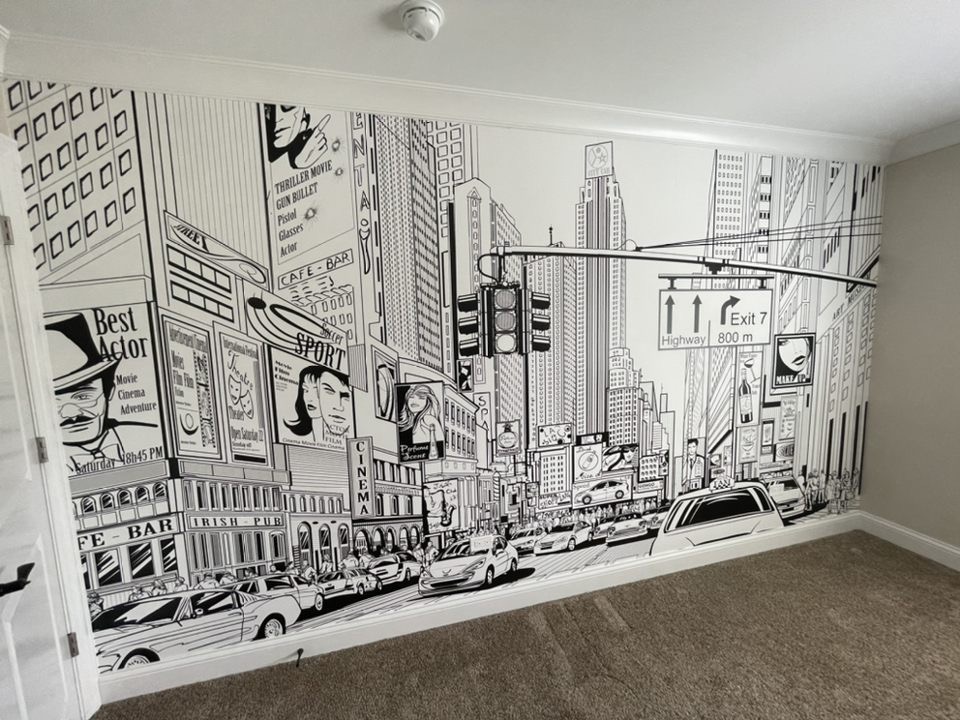Do you know what you should be looking for when you hire a contractor? How much do you know about contractors?
If you are listening to our podcasts, this blog post is the conversation I had with Tom Reber of The Contractor Fight. Tom is a former paint contractor from Chicago, now lives in Colorado as a business coach for contractors and former marine who tells it like it is. Read or if you’re too busy, listen to the podcast! Then let us know your thoughts and if you are looking to hiring a contractor!
David: Hey, everyone. Welcome to The Paint & Paper podcast. Today I am joined by Tom Reber of The Contractor Fight and Motor Hard. He is a coach for contractors. I’ve known him for several years and wanted to do a podcast with him because I thought he can give some great advice to you as a consumer on how to hire a contractor in your home. Welcome, Tom. How are you doing?
Tom: I’m doing great. How you doing, Dave?
David: I’m doing great. Glad to have you on the show, finally.
Tom: It is. It’s great to make this happen. I appreciate you working all out man.
David: In the intro, you’ve got some great insight because you do a lot of coaching with contractors. I actually did some work with you before and you were great with that. I thought it’d be great just to hear your perspective as a consumer because you’re always coaching a contractor what should they be doing. I thought it’d be fun to flip that. Now, you’re the homeowner, consumer, what they should be looking for when they get someone in their house?
Tom: Oh, absolutely. I think that’s a great a great topic for today because, as you said in the beginning, I run an organization podcast called The Contractor Fight, and it’s really a movement. I’m leading a movement to truly help the contractors get their heads out of their butts. It’s funny, just about every problem a contractor has in their business whether a customer’s not happy, whether he’s not making money, he can’t find employees, whatever it is. I come from 100% belief that it’s the contractor’s fault, 100% of the time. But until contractors own that, then they’re gonna continue to have problems and not grow a stronger business. I’m giving just some context to you of where I’m coming from because I don’t want anyone confused.
My movement is called The Contractor Fight and the fight that I’m telling is that, the fight is not with the consumer, not with HDTV, and all these other bogus platforms that deceive homeowners. What things realistically cost and don’t cost and how long things take. But the fight that I’m asking contractors to fight is to take care of their own camp first.
Take care of what’s between your ears. Make sure that you’re delivering an amazing experience to your clients. Setting expectations. All these things are in the hands of the contractor.
It’s amazing, I grew from zero to over 300 jobs a year in three years in my painting company years ago that I own, simply because we focused massively on the experience and the average consumer is happy to pay more when they have somebody that they feel that they trust. That’s just the context I wanted to give any consumers that are listening is that I’m fighting for the contractors but I’m actually on the side of just human beings in general. I’m not picking sides or anything. I’m trying to weigh it one way or the other. Does that make sense?
David: Makes perfect sense. You kind of framed that out because I know one thing when I’m going in the homes and give an estimate, I kind of set that bar of, “I don’t care if you hire me or not, I just wanna make sure that you get the best information possible to make the best decision for your house.”
Tom: Right. Here’s something that’s gonna freak out most consumers. Dave, by the way, if I make it through a whole podcast today without swearing, it’ll be a first ever. You’re gonna set history here today. You’re gonna make history. We’re gonna do it, man, I feel it. If you’re a consumer and you’re listening to this, I’ve coached hundreds and hundreds and hundreds of companies. Worked with contractors, I’ve been a contractor, the average home improvement contractor does not make any money.
I’m gonna say it again, he comes to your house, tells you it’s gonna be $10,000 to hang some paper, paint something, whatever. You’re crapping yourself because you’re like, “$10,000? I thought it was gonna be $2,000.” Well, out of that $10,000, that contractor, if everything goes right, meaning he’d estimated the time properly, there weren’t any crazy conditions, we got the coverage out of the materials that we plan on getting, and all those other things. If everything goes right, the average home improvement contractor makes maybe a 5% profit. This is why I’m pissed off at places like Angie’s List and Home Advisor and HDTV, they’re deceiving you into thinking that we’re a bunch of crooks, that were expensive, and all these garbage.
When the reality is the average home improvement contractor, the average guy who owns the business only makes about $55,000 a year.
David: What would you attribute as the biggest reason for that?
Tom: Because the contractor’s a wuss. He won’t charge more. He won’t take care of his own crap. Because if contractors as a whole took the business side of their business more seriously, they would run a stronger business and more profitable business, a business that would provide a better experience with the client, and in turn he’d make more money for many reasons; a, he’d be able to make more of a profit on each job. Listen, let me put in a perspective. I’d come to a $10,000 project with your help, Dave, what’s 10% of that? $1000.
David: $1000.
Tom: Most guys they make $500. Put that in perspective. This is a homeowner. Most homeowners think that contractors are crushing it, and most aren’t. Because even the guy that you’re paying cash and he’s a got a guy or two and he’s paying his guy cash and all those other, at the end of the year, he’s handing his accountants, hopefully, most of the boxful of receipts because he’s done a crappy job running the business side of his business. He’s gonna end up owing a bunch of back taxes and all these other stuff. David, you’ve done God knows how many hundreds or thousands projects in your career, how many times did the homeowners say, “Yeah, we wanted to have the guy that we hired before back but we can’t find them.”
David: A lot.
Tom: Yeah, a lot. That’s because contractors, like any other business owners, Mrs. Consumer who’s listening to this, you might cook really good cupcakes and your friends say, “You should open up a cupcake business.” That doesn’t mean that you can be a good business person. It just means you make good cupcakes. You’re probably not gonna make any money because this is not just unique to contractors, this is unique to most small business owners. They don’t make enough money.
Number one, the contractor’s not taking the business of running the business seriously. They still think they’re tradespeople and they’re really not. They need to flip it and become a business person first.
David: With that perspective what’re things they should be looking for when they’re calling either through Google, Angie’s List, wherever they’re going to get their contractor, what are the things they should be looking for?
Tom: Right out of the gate, if you call a company up, and they tell you how their sales process works. Dave, let’s pretend you’re calling me. Give me a call, ring, ring. Hello, this is Tom’s Painting.
David: Alright.
Tom: Good, let’s role play. You wanna bid.
David: I’m gonna bid you said?
Tom: No, you’re calling me. You wanna bid. Just roleplay it. I answer the phone, “Hello, Tom Painting.”
David: Hey, Tom. Dave giving you a call. I’m trying to get an estimate for some painting
Tom: Right, Dave. I appreciate you calling. Blah, blah, blah. Now, I’m gonna do some warm and fuzzy conversation here, and bond, and rapport, and then I’m gonna ask how you found us. I’m gonna get some of your information. Let’s fast forward to that and then I’m gonna say, “Dave, would it be okay if I shared with you our process of going about giving proposal and estimate?”
David: I’ve never had anyone do that before.
Tom: Okay, well, listen. You mentioned you found us on Google and that you liked all our reviews. One of the reasons that we have lots and lots of reviews, and we’ve been around so long and things like that is that we follow the process 100% of the time. Anytime that we don’t follow this process, none of us get what we want.
Here’s how our process works. In my case, in my company, David, and the guys that I coach is I basically say, “Head over to our website or text when you can upload a picture of your project and we’re gonna get on the phone, this is free.” This is a free conversation. This is a free estimate because most consumers don’t know that a free estimate, the word estimate is an approximation, it’s not an exact number. Honestly, that’s where contractors are screwed up too. We say, “I’ll come out and give you a free estimate.”
We spend three hours tap dancing with somebody and typing something up and sending this detailed proposal over next to the penny. That’s not an estimate. Estimates are free, computation should be paid.
Taking Control of the Sales Process
If somebody doesn’t take control of their process, if I’m the consumer and I’m giving advice to the consumers, if they’re not taking care of the sales process right out of the gate, to me, that’s a red flag. That you’re gonna get kind of a half-baked experience with this guy or this company because expectations aren’t gonna be set clearly, you’re not gonna have honest conversations about budget and different things like that. I totally understand that people wanna shop and compare and do their homework and all these other things but if right out of the gate if a company is not taking control of their sales process, to me, that’s a warning sign.
Another thing is when you finally do get the paperwork, don’t ever start a job without any paperwork where you’re totally clear of what’s gonna happen and what’s not gonna happen. I can’t tell you how many times early in my career before I got this right, my crew will be painting the house and the owner would be upset because we didn’t paint the closet. When the homeowner would just have me list them as an option and they thought there were included.
Pre-Job Walkthrough
We didn’t do a good pre-job walkthrough with the homeowner. We didn’t get on the same page because most homeowners are talking to several different contractors. They’re getting three or four bids or having all these conversations and let one guy said and this guy said, they all run together, total [inaudible 00:12:00] mistake on everyone’s part but you have to have that pre-job meeting where they’re gonna say, “Hey, we’re painting this, we’re not painting this. We’re moving this, we’re not moving this.” It’s initial, it’s in writing, and that’s another huge one.
A third bit of advice, I’m just rolling into it here for you buddy, read your contract. I did an experiment once. This one year, we did about 400 projects. I did, it was a small sample test, I took 10 random jobs and I put in the paperwork, like what’s included, what’s not included, the payment terms, and all this other stuff. But it wasn’t hidden, it wasn’t like 2-point font or anything like that, it was pretty much in broad daylight, it said, “Hey, if you’re reading this sentence call me at this number and I’ll give you $100 cash.” I did that on 10 people. I was trying to prove a point to one of my buddies saying that consumers never read the paperwork.
Now, it’s on the contractor, number one, to provide the paperwork but when they do, most consumers don’t read it. They don’t read something like, “Hey, we’re removing wallpaper with x amount of dollars per hour and this is what it doesn’t include.” We’re doing our job as a contractor being upfront then we get homeowners that are pissed at us saying we’re charging them too much and that’s not the case. You just failed to read the paperwork. Earlier I said everything’s back on the contractor, this is where when I would sit down and ink a deal with a homeowner.
I would point things out and have little checkboxes and go, “Hey, if we get into this wallpaper removal or whatever it is, this is how it works. Can you initial here for me?” Taking those few extra moments to read some things is crucial.

Charging Per Hour
The last thing that comes to mind here, and then ask anything what you want, don’t give a crap about what guys charge per hour. This is huge. One my coaching groups just the other day, this homeowner asked me what we charge per hour, and I told him and they’re like, “Oh my god. That’s outrageous.” Dave, you worked with my old painting company and things like that. We’ve done some jobs together. You do phenomenal work, and you’re a total pro, and my guys are total pro.
Here’s the deal, if I have a room, we just take a small bedroom and we’re gonna paint just the walls, would you rather hire the $100 an hour company or the $40 an hour company? What’s your first inclination?
David: Mine firstly is the $100.
Rates
Tom: Right. But you’re a contractor, it doesn’t count now. But if you’re a consumer, what is it, you’re going, “Hey, what’s the $40?” Here’s the problem, we were $100 an hour to paint that bedroom, but it only took us four hours. Our hourly rate included our materials because we negotiated with Benjamin Moore and Sherwin-Williams and big guys like that, to get amazing rates on material and sundries, and all those things.
One of our guys would walk in at 8:00 AM and at noon, he’d walk out, and you’d have a beautiful room that was totally done and it cost you $400. Where my competitors might have been charging $30 or $40 bucks an hour but it’s taking them six to eight hours.
I see consumers get hung up on what guys charge per hour but if I’m better and I can do it faster and more efficient without headaches and problems, I’m actually the better value. Eight hours at $50 is $400 and four hours at $100 is $400, it’s the same.
David: I have found with guys that are charging the $30 or $40 an hour given that bid, it looks good, but then like you said, read the contract, the fine print is they’re not including any materials in there.
Tom: Or it was one coat.
David: Yeah.
Tom: That goes back to your reading step. Hourly rates really don’t mean anything because at the end of the day, go back to the very first thing I said with taking control of the sales process. If I’m on the phone with the consumer and they say, “Hey, I’m looking to get a couple of bedrooms painted.” I’m gonna paint a picture. I’m basically gonna say, “David, listen. We can come in and go Taj Mahal on this thing and blow your face off and it will be in the cover of a magazine and that’s gonna be, I don’t know, two to three grand for the room, or we can come in and throw a couple of coats of high quality [inaudible 00:16:50] on the wall through 500 or 600 bucks which makes sense to you.”
If I bracket it like that with a homeowner because we could do either.
Variables
You know there are so many variables in the trade. This is where I’m asking consumers when somebody takes control of the sales process, and they have so many questions for you, they’re truly trying to save your time. They’re not trying to get a budget number out of you. Most consumers don’t wanna say what their budget is because they believe that the contractor will ride up to that budget number and all these other stuff. I do the same thing. I lie to salespeople.
We simply lie to salespeople because we’re afraid of taken advantage of but when you’re working with a company that, this sounds really bad the way I’m saying it, if you’re working with a company that really doesn’t need your job and they take control of the sales process, you’re probably gonna work with a really good company. They have plenty of leads. They have plenty of work. They don’t need your $1000. They want your $1000. They wanna build a relationship with you. But please understand, I’m not trying to be some prima donna here.
But I’m just saying, you gotta take control of that sales process. If somebody says, “Well, the other guy, he was gonna come in for $200 or $300 and paint that room and you’re telling me $600.” I go, “Okay. What do you think is our next move is? You’re gonna go along, call around, and get some other bids.” We just did each other a favor because we were honest with each other.
Open Conversations
Certainly, I’m [inaudible 00:18:27] through the conversation now and I know it’s coming off way more harsh than it should in real life. But I’m making the point here, have open, honest conversations. I had a guy who wanted to come help, I needed some of my grass cut, it was in Colorado Springs, and it was just tall desert grass from the hills near the mountains, and I needed it chopped down the next day. I screwed up. I made my deadline his deadline. I screwed it up, didn’t do it earlier, so I called around looking for somebody to do it. Every time, “Hey, can I just snap a picture and just tell me what it’s gonna be and come out and do it?” “Oh, no. I gotta come out and look at it.” I’m like, “You seriously can’t look at my lawn and tell me, I don’t know, whatever, of what it’s gonna be?”
If you’re truly just getting bids and shopping around and doing your due diligence which I encourage, be upfront about that when you call a contractor. Because I’m calling you dude, I’m like, “Hey, listen. I got my car dealership here that I own. I’m in charge of figuring out of what we’re gonna do to bring it up-to-date and make it look better. We’re just in the idea-gathering stage right now. I just wanna let you know we’re not ready to move ahead right now. We’re just looking for some idea.”
Then that contractor can truly give you that computation, give you those ideas, direct him to either some online resources that are gonna show you different projects that they might have done.
Without you both carving out a couple hours of your life to meet in your dealership, in your home, or whatever it is, and honestly, many time times waste each other’s time.
David: Personally, for me that makes sense. I’m kind of [inaudible 00:20:23] too but I don’t wanna waste people’s time. I had to have my heater and boiler redone several months ago and man, that was probably my first time I had to go through the process of being the person on the other end, of dealing with contractors that are not returning calls, or they’re not asking information. I’m telling them what I want but they’re not listening. They’re trying to dictate what we’re looking for and it wasn’t even the same scope.
It’s like we’re looking for a Honda, “I know you want a Toyota.” “No. This is what I want and more importantly, this is what I need and this is what I’m willing to pay for.” It was round and round. I think we ended up with nine estimates in one way or another. I kind of just gave up on it and randomly I drove by the company and I called them just for the heck of it and they came by. I knew they’d be the people we had but they were the best company because they did exactly what we were doing upfront. They established that rapport right away. I’ve got nothing but respect for that company. They just did an amazing job.
Tom: Why do we call a pro? Why do I go to a dentist? Why do I call a house painting company? Because they’re the experts in that field. As a consumer, I want that contractor to be confident, I want them to take control of the process, and guide me. I believe most consumers are that way. Back to what I said earlier, I believe most of the problems that are in the contracting industry and the bad experience people have and all that other stuff, 98% of it is on the contractor, because if you really kick butt in the experience, I mean, David you know my company right down in Chicago.
Out of every 100 jobs that came in, 85 were past customers and referrals. I couldn’t sell my way out of a wet paper bag on Google. Because people would tell them about the experience and how we treated them, and how they were respected, and how we communicated, I would say to the consumer out there, have a really short leash.
If you call them and they don’t call you back within 24 hours, move on, they’re dead to you. Seriously. Because I’m on the other end as everyone knows. I’m on the other end coaching these guys on my podcast, emails, and stuff, telling them to answer their phone, and to call people back, and to pay their people more. Here is another thing. If a company is more expensive, they’d probably have more expensive people. More expensive people are generally doing better work, and they’re happier, they’re gonna be there longer, and it’s gonna be a stronger company. There’s a million good reasons.
Future Career
We have a huge problem in this nation right now with getting guys and girls to come out of high school and go into the trades because there’s the lie that you gotta go to college to be successful. I know more millionaires that are contractors than are white-collared people. If you’re listening to this and you have a nephew or a kid ora grandson whatever it is that’s getting out of high school, you look up with a guy like Dave or some of these other companies that have their act together, there is no reason that in three to five years that kid can’t be making $75,000 a year having a company truck, no debt from college, having a clear path and a clear future, by the time they’re 23 years old.
Here’s the thing and I think this is what consumers need to own, when you’re pitting contractors against each other, and play the little pricing games, and all of the other crap, almost swear there Dave, when you’re doing that, you’re actually hurting the economy. You’re making it harder on our youth to actually see that the trade are a viable option for them. Because the contractor guy who’s coming at your house will be getting beat up on price all the time, never mind that most of it is in his own head, it’s his problem, which is playing a game here in a minute. When that guy can’t get bid, after bid, after bid, now he can’t hire somebody.
He can’t pay a kid more to work for him or whatever it is. The kid ends up flipping burgers or going to college and getting a degree for $200,000 that he’s never gonna use, and he’s not gonna be happy with it, and on, and on, and on.
Yet it’s hilarious because one of the biggest problems in the world right now, at least in the United States, there’s great contractors are having a really, really hard time finding people that wanna come into the trade. And I believe the biggest factor to that, there’s two; one is our high school, our high schools are doing a crappy job of making it a viable option, and number two, most contractors aren’t making enough money, so young kids go, “Why would I wanna go to work, get dirty, be tired, come home and be broke like my dad was?”
David: This will be a tangent but that’s alright. How much do you think can actually the, I’ll say, a false perception. You go to school and between nephews and family members, they think they’re going to college and when they come out, they’re gonna land that job, or invent something and be millionaires instantly. I know when, as we were looking for people, we actually just hired our first vet which has been an amazing experience. The work ethic that they come out with the military with is almost unprecedented.
But just the fact, from that high school, and even as they’re in school, that whole thing of sometimes you have to use your hands and there’s a lot of satisfaction that comes from that is just missing from a lot of people.
Tom: I think that both expectation or whatever you’ve called it is this huge result of the people that are influencing our kids as we’re growing up which is parents, the media, their teachers, their guidance counselors. Listen, I have two 17-year-old boys, and a daughter who’s 14. One of my sons told me all the time is all they ever talk about in school is you gotta go to college, you gotta go to college. We had a trades day here in Colorado Springs last fall, I think it was. My son was all excited to go, the school was gonna do a field trip for it, the high school, and all sorts of stuff. He was the only kid that signed up.
David: The only what?
Tom: The only one, it’s a small school, there’s only about 500, 550 students in the school. We live in a small town in Colorado here. They canceled it. I guarantee you, they were not making announcements like they were for SAT prep and things like that. Anytime they’re gonna have an SAT prep day at the school, they’re announcing that freaking thing 40 times a day and sending things home and all these other stuff.
But when it comes to the trade and dude, they were like heavy equipment operators, and electricians, and painting companies, and drywallers, and you walk around and I’m talking to these guys at the booth, I’m like, “What do you guys start at?” “$30 an hour.”
You know what I’m saying? Even if you don’t go work for the small painting contractor or the remodeling contractor, by God, go drive a big piece of Caterpillar equipment or something.
I have a client of mine, their son graduated high school, went to about a year of trade school, lived at home which nobody wants to live in home when they’re 18, I get it. They wanna get the heck out of there. But he lived at home and his first year after one year of trade school, of learning how to fix heavy equipment engines for, maybe it’s Caterpillar, he’s making $65,000 a year as a 19-year-old which is crazy.
I’m asking the consumers listening to this, and I’m gonna say the same thing I tell to contractors, I tell the contractors, “Pay your employees way more money. Pay them way more money. They want big boy money, make sure they’re doing big boy work. Killer quality work, great experience, not hacking movies in the yard when they’re working, not looking cigarette puffs around, not showing up like they just rolled out of bed with bed head.
Come to work like a professional, look people in the eye, communicate, be able to read and write, and upsell and take care of any issues that come up. You want big boy money, do big boy work.” That’s what I’m telling contractors all the time.
On the flip side, I’ll tell the consumers, “Please pay more money to the contractors but also expect them to do what they said they would do.” It’s that simple. Because I know at the end of the day…
Listen, I’ve hired contractors myself. I’m in this industry. I’ve had issues with contractors and I’m like, “Dude, I would’ve given you another $1000 to not have the problem that we’re dealing with right now.” The last thing the consumer wants is a to-do list of crap when a contractor leaves the house, cleaning up, apologizing to the neighborhood or whatever the heck it is. Pay more but certainly expect more but be clear about those expectations. This comes back to the sales process.
One of the questions I always would ask prospects, David, I’d be like, “Hey, David. For $10 you get your house painted regardless of what company you hire and you write the final cheque, you hand it to them, and they’re pulling away in their truck. How are you gonna know you hired the right guy? And then, I would just shut up.
Consumers, if the contractor asks you that just say, “Just be honest.”
Here’s the deal, all the data has come back, it’s not money, don’t lie to them, don’t tell them you’re looking for the cheapest price because you’re not, I know you’re not. That’s the easy go-to answer that we’re trained to have as consumers is, when we don’t wanna work with somebody, we say it’s about the money. It’s not about the money because I will pay just about any amount of money for any service or product if trust is built.
The real reason that you think the guy is too much money is because you don’t trust them. I’m asking you to be honest and tell them that. Don’t lie to them and tell them it’s the money. Have some integrity and say, “Listen, I really wanna do work with you but at the end of the day, I just don’t trust that you’re gonna get the job done.
To be honest, I have no probably with the money. I don’t trust you’re gonna get the job done because you didn’t call me back on time, you were late for an estimate, and all these signals there that you’re shooting up in the air are all indicators that you’re probably not just a trustworthy company.”
Say it in a nice way, in a way that’s unique to you, but help the guy get better. Because I guarantee you, going back to the other side now, 99.99% of the contractors out there are amazing human beings. They’re a family man, they’re adopting kids, they’ve given to charity, not only are they working for free in their normal day job not making any money. They’re volunteering their time in the weekend. They’re mentoring people and they’re trying to live the same life way you are in your community, they’re putting their kids through school, and all these other stuff, and paying for weddings.
They’re good people. They’re good people so shoot them straight, they’ll respect it, they’ll thank you for it.
I had a customer do that for me once. She said, “You came on referral. We really thought we’re gonna hire you and we ended up not hiring you.” I’ll spare you all the details but she was an HR professional and she’s like, “I would want my company to know why is somebody not hiring them.” She’s like, “Yeah, you are more expensive but we didn’t care. Yeah, it was this. Yeah, it was that. It was just the way that we felt we were treated. We felt like we had hired a guy that used to work for a national franchise to sell for us.”
They just felt like he just didn’t give a crap when he was out there meeting with them. That’s what it came down to.
As the owner, I wanna know that, not for the guys in trouble but so I can help the guy, so I can coach the guy, so I can, “Hey, you were off your game that day. What happened?”
David: Analyze those for reviews. We want their honest opinion. If we did something that wasn’t up to par, we wanna know. If we have all five-star reviews, that’s great but I know every day, there’s stuff that comes up. You’re not on your A+ game every single moment of the day. If there’s something that wasn’t right, personally, I wanna know because, like you said, I wanna be better.
Tom: Yeah. We wanna get better. I’m asking the consumers to be honest. Be honest. Like I said earlier, have a short leash if the dude… I have a guy who’s in one of my coaching groups and he’s like, “Yeah, they told me we were doing the job. $5000 project, landscaping job. I called her the night before and I said, ‘Hey, we’re coming tomorrow.’ And she says, ‘Oh, we already did the work.’” I asked my client, I said, “Dude, when did you sell the job and when did you call to show up?” He said, “Well, I sold it in April and I called in June.” I said, “So, what happened in those months between, in that gap?” He says, “Nothing.” I said, “Well then you deserve what you got.”
If you’re talking with a company, and they’re not keeping the relationship warm, and keeping them in the loop, and sending these links to how to get your home ready on their website with videos and things like that, then you’re probably gonna have some problems during the project. If you’re working with a company that’s like Johnny on the spot when it comes to getting back to or answering the phone, taking control with the sales process, setting an expectation, it might be three months before they come to the work.
But every couple of week, or something like that, you’re getting emails, or a text, or a phone call saying, “Hey, I just wanted to update you. We’ve had more dry weather than we planned on having. Right now, we’ve bumped everybody up a week. If that can change we’ll keep you in the loop.”
Whatever that looks like, put yourself in the consumer’s shoes, you’re gonna be totally fired up by that.
But when you’re out of sight, you’re out of mind. When you’re out of mind, you’re gonna hire somebody else. I guess my big ask here is consumers, put the screws on the contracting industry in a positive way and help us get better because it’s full of a lot of really great guys, a lot of great girls that are doing some amazing things, doing some amazing work. They wanna serve, they wanna take care of you but quite honestly, they have so much head trash around you having a problem with the price that they can’t even function properly.
I see it over and over. They’re so freaking shell shock because they’re afraid you’re gonna say, “Oh, my god. That’s way more money.” Well, it should be if it’s better. If the service and the value and the quality and all that stuff are better, it should be more money. Stop paying attention to HDTV because that’s just a joke. If they painted the room in 45 minutes and it cost $37.
David: Yeah, a little off.
Tom: This is the last thing and then I’m done because I get fired up on this one. People complain about how expensive a contractor is but the only guy he can afford is the $12 an hour dude with a criminal record as a laborer. Think about who you want in your daughter’s bedroom painting it. Think about who you want hanging around your house when your mother-in-law is in a wheelchair or whatever it is. Or the dude–I remember we painted a house and the father-in-law lived there and he had emphysema.
You want a bunch of cheap, non-experienced guys that aren’t naturally respectful, honorable, happy human beings around that house, that just costs more.
I can’t deliver amazing human beings in your home, a paint job’s a paint job, carpentry is carpentry, the craft is the craft, of course, you expect that to be good, but it’s all those other things around it that most consumers complain about when they had to complain about the contractor.
I’m asking you to be a little more graceful when somebody comes to you and says they’re expensive, it’s probably because they have a philosophy that, “I’m only gonna hire the best people and put the safest, most talented, respectful people I can into somebody’s home or business. That just costs more, period. That will never change. I said I was done, so I’m done.
David: That just makes for a better experience at the end of the day. You don’t want headaches when you’re trying to – our tagline is ‘We help you love the house you live in’. Coach has asked me, “How did you come up with that?” The biggest thing was when we’re done or as we’re going through that, I want that homeowner to come in and they have that smile. It’s ear to ear. It’s almost the, the closest thing we can equate it to is that we started raising bees two years ago. When someone puts that spoon of honey right out of the hive in that, you know that smile of pure joy, that’s what we want for our customers. If they have that, they’ll never be a negative connotation from a contractor. It’ll be pure, “I loved it.”
We hope for every contractor and every homeowner has that same experience.
Tom: Yeah. you can’t deliver that for cheap.
David: No.
Tom: There was an old story of Russian nuclear power plant that had alarms going off and all this other stuff, and they’re gonna have this meltdown, levels are blowing, and this and that. The only guy that could fix it was some engineer in Germany, so they flew the guy there within a couple hours to this Russian plant. He walks in, walks up to this big wall with hundreds of dials and knobs and gauges, and he stared at the thing for about two or three minutes, and he’s looking, and looking, and looking, he walks over, turns this one a little, walks over, turns that one a little, turns one more, and all of a sudden the alarms stopped, all the pressure starts releasing, and all this stuff, nuclear crisis avoided.
He goes back to Germany, sends the bill to the nuclear power plant says, “Here’s the bill for $100,000.” They were like, “You were here 15 minutes.” He resented the bill and he said, “15 minutes of my time $100. Avoiding nuclear disaster, 99,99 whatever it was dollars. You’re paying for the experience.”
You’re paying for somebody to come in your home or your business, not paying for the time.” You’re paying for the experience and the wisdom and the, “Oh, I remember when I made that same mistake eight years ago, I’ll never do that again.” That’s what you’re paying for so that your life and experience you have during this remodeling project or whatever you’re having is much more enjoyable. That experience costs more.
Dave, if you’re gonna have spine surgery tomorrow, you want to go to the guy that’s got 24, 30 years in the game, and he’s really hard to get on the schedule, or do you wanna go for the guy who’s really got a lot of opening and he’s willing to negotiate on price?
David: I want the guy that operated on Joe Montana to make him go play football again.
Tom: Yeah, that’s some pressure.
David: Here’s a question because you said this and I wanna know the answer. You said you had two contracts about the $100. How many people saw that?
Tom: Zero. Nobody ever called me.
David: No.
Tom: I was just doing a little test just to go I was just making a point. He’s like, “They’re reading it.” I’m like, “No, they’re not reading it. They never read it. If they read it, they would not have asked me the seven questions they just asked me because they’re all right there.” I know you have that.
David: Yeah. I know we’re both short on time, but how can guys get ahold of you if they got questions with their contracting business or just kind of follow-ups on stuff we had today?
Tom: Absolutely. Go to the thecontractorfight.com or go to iTunes or Stitcher, whatever podcasting site, The Contractor Fight, you can give a listen and get in touch.
David: Awesome. Thanks for your time today. I really appreciate it.
Tom: I appreciate you having me. You have an awesome day. Keep up the good work, man.
David: Alright, thanks, man.















